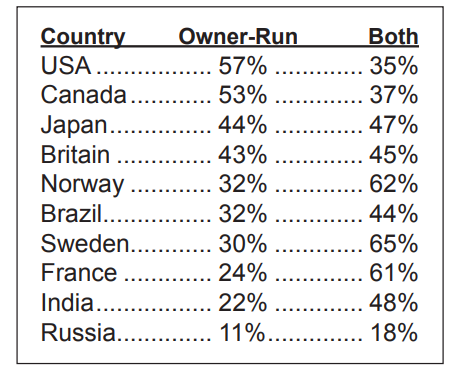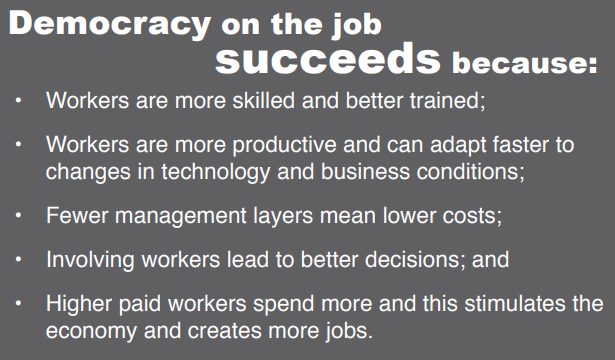There is a wide-spread belief that the United States is a democratic, free, and fair country. Most Americans also mistakenly believe that these rights, spelled out in the U.S. Constitution, also protects them on the job. They are mistaken because these Constitutional rights only apply to government and does not apply to private employers at their place of business.
For almost every American worker, there is no such thing as freedom and democracy on the job. The only exceptions may be the 12 percent of unionized workers protected by their union contracts and unionized public employees in federal, state, or city governments. Even with a union contract, the degree of freedom and democracy available to workers is limited and narrowly applied to issues such as safety. Even with a union contract, management will say they have the right to make every decision and do everything their way, unless it is limited by the union contract.
Seven out of eight American workers have no union and have no right to speak freely on the job or to vote on anything that happens on the job. Management makes all the decision and has total control of the workplace. Workers risk being demoted, punished or fired for talking back to management (being insubordinate) or not doing exactly what management wants them to do. Some employers even reach beyond the job and limit what employees can do or say in their private lives away from the job. Workers have been fired for posting pictures on Facebook or making comments and tweets which management felt was inappropriate.
Workplace dictatorships
A 2008 survey found that one out of every four working Americans (25 percent) describes their workplace as a dictatorship, according to a June 2008 survey commissioned by the non-profit Workplace Democracy Association. The poll was conducted by Zogby International and surveyed 2,475 people about their feelings towards their boss and workplace.
The survey found that less than half of working Americans—46 percent—said their workplace promotes creative or inventive ideas, while barely half—51 percent—said their co-workers often feel motivated or are mostly motivated at work. Only one-third, or just 34 percent of bosses in the American workplace react well to valid criticism, according to the survey; 31 percent believe their human resources department or upper management “almost always” or “sometimes” hire the wrong people; and 18 percent said they would feel more motivated at work if employees were selected by groups of coworkers.

The chart above shows the results in selected countries of people who think only owners should run their business and appoint managers or whether both owners and employees should participate. The U.S. had the highest (57 percent) of people who thought owners only should run their business.
ere selected by groups of coworkers. “Traditionally-managed companies, by inadvertently draining the motivation levels of their employees, are stifling productivity, innovation, and creativity,” said Asher Adelman, Founder and President of the Workplace Democracy Association. “Companies cannot expect to remain competitive when such large numbers of employees do not feel like they are treated like responsible adults nor when they feel like their input has little or no impact on the company’s decision-making process,” said Adelman.
In 2006, Gallup conducted two polls on employee turnover. They found that 82.8 percent of the employees left their companies and 17.2 percent moved to a new position in the same company. Of those who quit, almost 69 percent said it was due to the lack of advancement or promotional opportunities, a poor fit to the job, or bad management and a bad work environment. Only 22.4 percent left because of pay and benefits.
Gallup concluded that 75 percent of the reasons for employee turnover could be directly influenced by management style and behavior.
U.S. Workers Expect Dictatorship
The last line of the national anthem of the United States, the Star Spangled Banner, repeats the words, “O’er the land of the free and the home of the brave,” as the last line in each of the anthem’s four stanzas.
It is surprising that “the land of the free” was the single most undemocratic country in terms of how its people view workplace democracy. A 1991 World Value Survey of over 38,000 people in 50 countries asked how business and industry should be managed. The results were published in 1996 by S. Wojciech Sokolwski of Johns Hopkins University. [see www.hartfordhwp.com/archives/26/062.html]
People in each country were asked which of these four statements came closest to their opinion?
1. The owners should run their business or appoint the managers.
2. The owners and the employees should participate in the selection of managers.
3. The government should be the owner and appoint the managers.
4. The employees should own the business and should elect the managers.
In the United States, 57 percent thought that owners should run their business or appoint the managers. This was the highest among the 50 countries. The average response of all countries was 34 percent. The countries that most opposed absolute control by management were Belarus (9 percent), Russia (11 percent), and China and India (22 percent).
The most popular response was option number two where owners and employees would participate in the selection of managers. The overall average was 43 percent and the countries with the highest support for employee participation were South Korea (68 percent), Sweden (65 percent), Norway (62 percent), and France (61 percent). Only 35 percent of those surveyed in the United States thought workers should participate in selecting managers.
We could combine the responses to options two, three and four as supporting some form of democracy where employees and the government have more of a say in running a business. We would then have two responses—option one where management has total control and option two where there is some democracy. When we do this, the United States comes in dead last with only 44 percent supporting some form of workplace democracy. The average response is 66 percent, and the countries that most strongly support workplace democracy are Belarus (92 percent), Russia (88 percent), China and India (78 percent), and South Korea (77 percent).
Sokolwski’s concludes: “As far as workplace relations are concerned, U.S. is the most authoritarian country of those that were surveyed. The source of that unfortunate state of affairs lies in the weak political position of labor in this country. It is clear that labor must gain its own political voice to have a lasting impact on the democratization of labor relations in this country.”
Democracy on the job works well—a tale of three countries
ABB, a high voltage transformer company, was a merger of two engineering firms from Sweden and Switzerland. It was run by Swedish manager Percy Barnevik.
ABB also makes software and the electronics that control the giant cranes which load and unload container ships.
The company had three factories in Finland, Switzerland, and Australia but allowed local management to run their plants.
The global economic recession of 2008- 2009 caused drop in sales and hardships for all three companies.
In Finland, worker participation eliminated layers of management and formed work teams. This led to more efficient production and the company succeeded.
In Switzerland, worker participation led to the development of new products and innovations and the company succeeded.
In Australia, workers were not involved, management made the decisions and the company resisted changes. The Finnish manager was sent to rescue the plant he concluded investments in new technology and worker training to use the new technology would be too expensive and the plant was closed.
The example of ABB is only one of many examples of how worker participation and workplace democracy leads to more successful and competitive businesses and more democratic societies.

Dictatorship on the job fails because:
• Workers are not trained and lack skills;
• Workers can’t adapt as quickly to changes in technology and business;
• Management tends to fire or replace workers;
• More managers are needed to manage workers which leads to higher costs;
• Bosses make bad decisions and mistakes when they lack information and don’t consult with their workers;
• Higher profits and wealthy owners don’t create jobs because they tend to buy luxury goods and don’t reinvest in their business; and
• Low paid workers spend less and this means less demand and less jobs.
